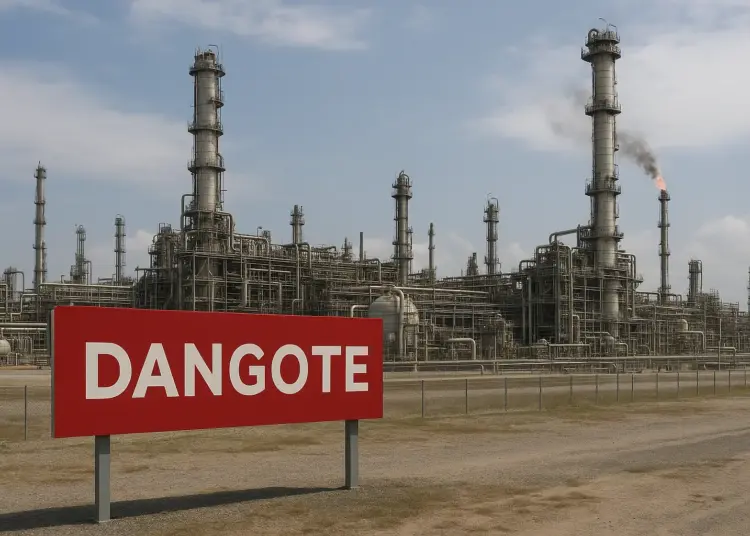Story Highlight
– UK watchdog clears Dangote Refinery of fuel allegations.
– Impact Investigations Platform verifies compliance with regulations.
– Allegations of dirty fuel imports found unfounded.
– Refinery maintains adherence to industry standards.
– Confidence in refinery’s operations affirmed by regulatory body.
Full Story
The UK’s Impact Investigations Platform (IIP), a prominent energy regulatory body, has released a report confirming that Dangote Refinery operates within the legal frameworks regarding fuel imports. This decision follows allegations of the company engaging in the importation of substandard oil products.
In recent months, there has been considerable scrutiny surrounding fuel quality and compliance within the industry, with various entities raising concerns about potential breaches of regulations. The IIP’s investigation into Dangote Refinery aimed to ascertain whether these claims held merit.
After a comprehensive review of the refinery’s operations and import practices, the IIP found no evidence to support the allegations. The findings implicated adherence to prescribed industry standards, effectively clearing the refinery of any wrongdoing. In a statement, the IIP emphasised, “Our thorough assessment indicates full compliance with all regulatory measures concerning fuel quality and import practices at Dangote Refinery.”
The implications of this report are significant for the Nigerian-based company and the broader oil and energy sector. Dangote Refinery, which is touted as one of the largest refineries in Africa, plays a crucial role in the region’s energy landscape. The refinery’s operations are integral not only for domestic fuel supply but also for stabilising the local economy, which is heavily reliant on energy resources.
While the IIP’s ruling has been welcomed by Dangote Refinery, it raises critical questions regarding industry regulation and enforcement in the UK. Experts in the field have pointed out that transparent oversight is crucial to maintaining public trust in energy sources. Dr. Sarah Lawson, a renowned energy policy analyst, remarked, “The conclusion reached by the IIP reinforces the importance of rigorous checks and balances within the sector. It’s paramount that companies operate transparently to mitigate any potential concerns from stakeholders and consumers alike.”
The scrutiny placed on Dangote Refinery is not isolated, as the energy sector globally faces pressures to enhance standards and combat practices that could undermine fuel integrity. This incident highlights the ongoing need for vigilance among regulatory bodies to ensure compliance and protect market integrity.
In a further response to the IIP’s findings, a spokesperson for Dangote Refinery stated, “We are pleased that the IIP has recognised our commitment to quality and integrity. Our operational protocols are designed to meet all regulatory requirements, and we remain focused on providing safe, high-quality fuel for the market.”
The landscape of energy production and importation is changing, driven by advancements in technology and increasing public demand for accountability. Stakeholders in the industry are expected to examine the lessons learned from this investigation closely. With energy security becoming ever more critical, refining practices must continue to evolve to meet both regulatory expectations and consumer needs.
Public discourse around fuel imports has also been amplified by rising global oil prices, which have sparked debates about economic resilience and sustainability within energy markets. Experts believe that cases like that of Dangote Refinery can contribute valuable insights into better regulatory frameworks and enforcement mechanisms that could benefit the industry at large.
Moving forward, as energy watchdogs fine-tune their frameworks and adapt to emerging challenges, it is anticipated that the outcomes from such investigations will play a pivotal role in shaping policies, ensuring safety, and promoting environmentally sustainable practices across the sector.
The findings and ongoing dialogue surrounding compliance standards serve as a reminder that thorough investigations are essential not just for individual companies, but for maintaining the robustness of the entire energy sector.























This finding is welcome and should reassure stakeholders that the refinery meets required standards. It also highlights the need to maintain robust quality control systems, transparent reporting and proactive regulatory engagement to preserve public trust as market pressures evolve.
Good to see the investigation cleared the refinery and that operations meet required standards. This outcome highlights how essential robust testing and clear documentation are for maintaining public trust and keeping supply chains resilient. Regulators and industry should keep focusing on transparent oversight and consistent enforcement so standards are upheld as market pressures and scrutiny increase.